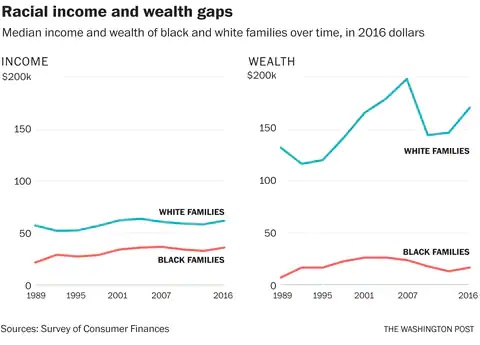No democracy can exist with a wealth gap between the majority of citizens and its most privileged and powerful political layer of citizens.
The wealth gap that developed since the administration of Ronald Reagan (1981–1989) now approaches that preceding the Great Depression (1929-1932). At both times, the social and political implications have forced political changes that challenge the established order.
Wealth gaps develop over time and are perpetuated by established social and political practices and institutions. Wealth is a concrete measure of savings from labor, investments, and savings. It is comprised of assets, such as housing, bank deposits, insurance plan-401(k) and pension values, stocks and mutual funds, home equity, minus liabilities, such as a mortgage, consumer, and educational debts.
The financial have-nots today are the same as yesterday and will be tomorrow. But there is also a huge demographic force working that will make the problem worse. By 2043, people of color overtake whites as the majority in the U.S. population. This titanic change has huge political and economic implications that will make a serious problem worse.
One dire estimate from the Corporation for Enterprise Development and Institute for Policy Studies, found in a 2016 study that “If average Black family wealth continues to grow at the same pace it has over the past three decades, it would take Black families 228 years to amass the same amount of wealth White families [had in 2013]. That’s just 17 years shorter than the 245-year span of slavery in this country. For the average Latino family, it would take 84 years to amass the same amount of wealth White families [had in 2013]—that’s the year 2097.”
 It takes generations to create wealth, so fast solutions are rarely offered. But, thanks to readily available sources of large data and analysis, the wealth gap today is better described than at any time in U.S. history.
It takes generations to create wealth, so fast solutions are rarely offered. But, thanks to readily available sources of large data and analysis, the wealth gap today is better described than at any time in U.S. history.
The resulting analysis provides certain confirmation of what many know. A June 19, 2019, Washington Post article found that a “typical black family has just 1/10th the wealth of the typical white one. In 1863, black Americans owned one-half of 1 percent of the national wealth. Today it’s just over 1.5 percent for roughly the same percentage of the overall population.”
The gap is confirmed by other articles in The New York Times, Forbes, and The Center for American Progress, which found that “In 2016, the median wealth for black and Hispanic families was $17,600 and $20,700, respectively, compared with white families’ median wealth of $171,000.”
The economic situation for blacks and Hispanics remains dismal, despite Obama’s claim that income inequality is the “defining challenge of our time.” But, after eight years in office, he failed to make any substantial improvement to the gap.
Nor is there any agreement that the wealth gap is that serious or that it causes significant damage to the social structure. The conservative CATO Institute, largely funded by the top 1% of income earners, either disputes the data collections methods to make the wealth gap analysis, or else tries to make the case that the wealth gap is not a source of unhappiness, that income inequality does not correspond with social immobility and that inequality is not the source of “mass impoverishment.”
In the article, How Barak Obama Failed Americans, by William Darity (Dec. 22, 2016, The Atlantic), the author makes the case that it took over 150 years of social and racial injustice to create today’s dramatic economic injustice gap. But under Obama, as Darity points out, Obama did not start programs or develop legislation that would have the teeth to even begin to correct the entrenched wealth gap problem that exists between black and white workers, including the larger gap that separates black females from white females.
Citing research from a separate article by Ta-Nehisi Coates, Darity points out that:
- “blacks with a college degree have an unemployment rate almost as high as white high school graduates;
- “that completion of a college education leads blacks to carry twice the level of student loan debt than whites four years after the degree,
- “that blacks experience a significantly higher default rate on their loans, that black households have one-seventh of the wealth of white households;
- “that black families with $100,000 or more in income reside “in more disadvantaged neighborhoods than white families making less than $30,000.”
Later research by the National Asset Scorecard for Communities of Color (NASCC) found “a much higher discrepancy between black and white wealth than the gap that Coates reports.”
“If average Black family wealth continues to grow at the same pace it has over the past three decades, it would take Black families 228 years to amass the same amount of wealth White families [had in 2013].”
In the NASCC results, “Blacks with some college education actually have higher unemployment rates than whites who never finished high school.”
Worse, “at each level of education, the black rate of unemployment is twice as high as the white rate. Moreover, the relative economic position on virtually all indicators, including the racial unemployment rate gap, has not improved since the passage of the Civil Rights Act of 1964.”
And what was Obama’s response to the inequality? Not much. As Darity notes, “the Obama administration never gave serious consideration to aggressive transformative universal policies like a public-sector employment guarantee for all Americans, a federally financed trust fund for all newborn infants with amounts dictated by a child’s parents’ wealth position, or the provision of gifted-quality education for all children.”
As many have noted before, Obama was never a progressive, despite his campaign stance. He was too timid to undertake the FDR New Deal programs that raised everyone, of all races, out of the Great Depression. Instead, Obama took Clinton’s advice and moved to the right to become in essence, a liberal Republican, who completed the George Bush engineered bailout of Wall Street and then famously failed to prosecute, along with Attorney General Eric Holder, any of the white-collar executives who caused it.
The spectacle of executives going unpunished was the lasting picture of that crime that Americans remembered. It then became the fodder for Trump’s fake populist claim that he would have handled it differently to met out citizen justice.
My bet is that if Obama and Holdler would have prosecuted some bankers and mortgage-real estate executives who caused the recession, a Democrat would have been elected again in 2016. But Obama and Holder sat silently. The progressive message offered by Bernie Sanders was largely ignored by establishment Democrats in the 2016 campaign. Then, Trump filled the void with ludicrous promises and fear mongering. This set the stage for the most corrupt presidential administration in history to take power.
Nothing Bold from Obama
As Darity cites the elements of the racial wealth gap between blacks and white, he is understandably angered that Obama failed to enact the needed bold economic policies to address this systemic problem. Darity is very disappointed in Obama and writes “it has been damaging to have Barack Obama, a black man speaking from the authoritative platform of the presidency, [to] reinforce the widely held belief that racial inequality in the United States is, in large measure, the direct responsibility of black folk.”
However, as Darity makes his strong case that Obama failed to take bold steps to correct the racial injustice problem, he makes the case for a new, controversial solution: reparations.
This is the new approach to solving the racial injustice problem. It is one most American will say they will consider in public and totally reject in private. Advocates of identity politics may push it, but it is a new proposal that is not needed. Just ask Dr. Martin Luther King.
In the last speech King gave in Memphis, he said Americans had to “question the capitalist economy” and then he called for “a revolution in values.”
As quoted in an article in The New Yorker by James Wood, “The Time of Your Life,” (May 20, 2019), King told a staff meeting of the Poor People’s Campaign in January 1968 that he “didn’t believe capitalism, as it was constructed, could meet the needs of poor people, and that what we might need to look at was a kind of socialism.”
Knowing he was treading in dangerous waters, King then told the group that it that statement was repeated outside of the meeting, he would have to deny it. King studied the works of Karl Marx and once said his favorite philosopher was Frederick Hegel.
King was very familiar with reparations. In this speech from 1968, King makes his case. He spoke about “A gigantic Bill of Rights for the Disadvantaged, our veterans of the long siege of denial”—including “plenty of room for white “veterans” in the mix,” according to Jonathan Rieder of Barnard College.
So, if there is to be a large federal monetary redistribution program that includes blacks, as well as many whites, maybe it is a misnomer to call it reparations. What may be needed is a New Deal-type program, akin to the post-WW II GI Bill of Rights. Since King said capitalism has limitations and “we might need to look at was a kind of socialism,” what type of reparations program would he envision that included a financial remedy for blacks, as well as disadvantaged whites?
King never had the time to develop one, but in the 51 years since King’s 1968 speech, the wealth gap has become severe. As analyzed by the French economist Thomas Piketty, inequality is built into the system. This is because when an economy has a rate of return on capital exceeding the growth rate, inherited wealth always grows faster than earned wealth.
When people in a society have no legacy of inherited wealth and rely on jobs that only cover expenses, there is no such thing as inherited wealth. While Piketty and U.S. economists have covered the wealth gap at the top 1% of the pyramid, Darity and the NASCC have done the research for its impact on Afro-Americans in the bottom quartiles.
Would these new facts on the 20th Century’s wealth gap have caused King to re-examine his vision of reparations? Or, would he have pushed ahead on his position that the limits of capitalism necessitate the need for a new form of socialism that includes whites and blacks? If a new form of socialism were needed, it would require an expanded definition of “reparations” resembling one of New Deal scope, a dynamic version of democratic socialism. This is what is needed today.











